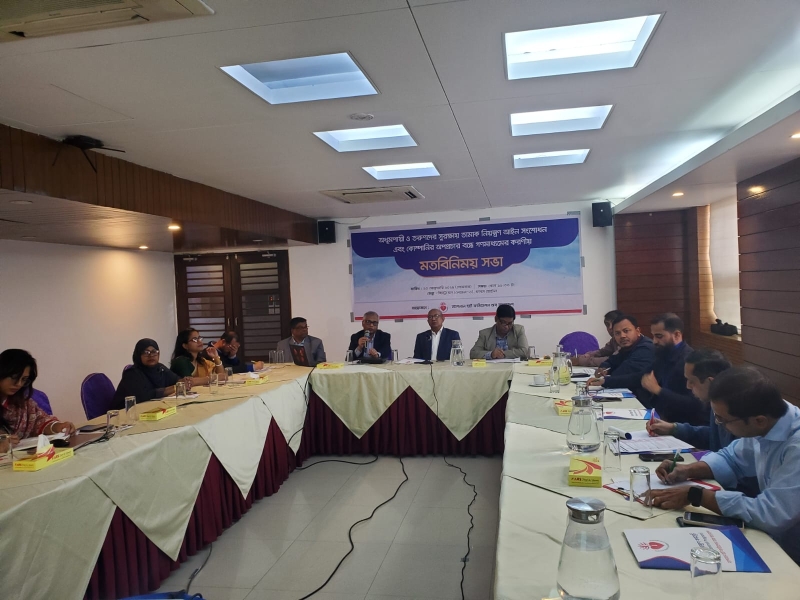- Militant Attacks Kill 33 in Balochistan; 92 Assailants Dead |
- Power generation at Payra Thermal Power Plant 1st unit starts after a month |
- Irregularities, injustice will no longer be accepted in politics: Jamaat Ameer |
- 2 arrested in Jhenaidah for allegedly selling madrasa student |
- Koko’s wife campaigns for Tarique in Dhaka-17 |
Tobacco kills 1.61 lakh annually in Bangladesh, experts say

Dhaka, 10 Feb -Mentioning that some 1.61 lakh people die every year due to tobacco consumption in Bangladesh, speakers at a seminar said the media should play a crucial role in countering the manipulative tactics of the tobacco industry.
These issues were highlighted at a discussion meeting titled "Amending the Tobacco Control Law to Protect Non-Smokers and Youth: The Role of Media in Countering Industry Interference", held in the capital on Monday.
The National Heart Foundation of Bangladesh organised the event.
Ignoring this alarming death toll, tobacco companies obstruct amendments to the tobacco control law by emphasising revenue concerns, said speakers.
In Bangladesh, 71% of total deaths are caused by non-communicable diseases and tobacco use is a major preventable cause of these deaths.
Presided over by Professor Dr. Khondker Abdul Awal Rizvi, President of the organisation, Prof. Dr. Sohel Reza Choudhury, Head of the Department of Epidemiology and Research, presented the keynote speech.
The National Heart Foundation said that approximately 38.4 million adults in Bangladesh are exposed to secondhand smoke in public places and public transport, despite being non-smokers.
The current interim government has taken steps to amend the existing tobacco control law to protect non-smokers.
However, since this initiative began, tobacco companies have attempted to create obstacles by lobbying the Ministries of Finance and Law, falsely claiming that the amendment would reduce revenue and employment opportunities.
Meanwhile, an analysis of National Board of Revenue (NBR) data reveals that after the enactment of the Tobacco Control Act in 2005, cigarette tax revenue increased by 17.97% and 37.52% in the following two fiscal years.
Similarly, after the 2013 amendment, cigarette tax revenue increased by 25.51% and 46.52% in the next two fiscal years.
Besides, data from the Bangladesh Bureau of Statistics (BBS) 2021 indicates that the number of retail shops selling food, beverages and tobacco products is only 196,341 and these shops primarily sell other goods along with tobacco products.
This refutes the misleading claim that amending the law would lead to massive job losses.
Journalists attending the event emphasized that young people are the future of the nation, yet they remain a primary target of tobacco companies’ aggressive marketing strategies.
To protect the youth, social awareness must be strengthened alongside urgent amendments to the tobacco control law.
When speaking, Prof. Dr. Rizvi said that more than 61,000 children suffer from diseases caused by secondhand smoke.
Besides, due to the lack of stringent laws, 6.9% of adolescents aged 13 to 15 use tobacco products, he said.
He also urged the government to quickly pass the proposed amendments to safeguard young people and prevent avoidable deaths.
It is worth mentioning that to align the existing law with the World Health Organization’s (WHO) Framework Convention on Tobacco Control (FCTC) and bring it up to global standards, the Ministry of Health has proposed several key amendments.
These include banning designated smoking areas in all public places and public transport; prohibiting the display of tobacco products at points of sale; completely banning corporate social responsibility (CSR) activities by tobacco companies; Increasing the size of health warnings on tobacco packaging from 50% to 90%; Banning the sale of loose cigarettes, unwrapped tobacco products, and smokeless tobacco products in bulk, and prohibiting e-cigarettes and all emerging tobacco products entirely.
Former BCIC Chairman Md. Mostafizur Rahman and several senior journalists from leading media outlets attended the programme.

